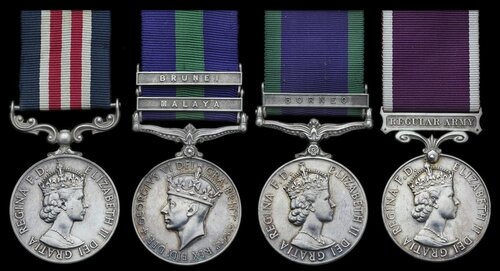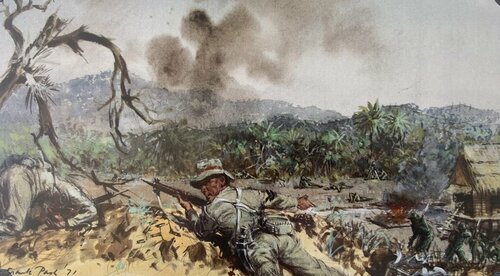Auction: 21003 - Orders, Decorations and Medals
Lot: 527
A superb 'Battle of Long Jawi' 1964 M.M. group of four awarded to Captain (QGO) Tejbahadur Gurung, 2nd King Edward VII's Own Gurkha Rifles (The Sirmoor Rifles), for his remarkable action when he commanded a small party of thirty against an enemy force of several hundred - holding the vital ridge for several hours under fanatical attacks before a gruelling tactical retreat in an action of epic proportions; a party of the enemy were eventually ambushed and as recalled by Gurung, who made sure he was present, 'all were killed'
Military Medal, E.II.R. (21134797 Cpl. Tejbahadur Gurung. 2 G.R.); General Service 1918-62, 2 clasps, Malaya, Brunei (21134797 Rfn. Tejbahadur. Gurung. 2 G.R.); General Service 1962-2007, 1 clasp, Borneo (21134797 Sgt. Tejbahadur Gurung. M.M. 1/2 G.R.); Army L.S. & G.C., E.II.R., Regular Army (Lt. Tejbahadur Gurung. M.M. 2 GR.), a few contact marks, very fine (4)
M.M. London Gazette 18 August 1964:
'On 28th September 1963 Corporal Tejbahadur Gurung was commander of a mixed force of six Gurkhas, three policemen and twenty-one Border Scouts at Long Jawi, a long house village some forty miles from the Indonesian border. Just before first light he heard that the Indonesians were about to attack. He immediately ran to the Scouts' hut to give the alarm. While doing so he was subjected to machine gun fire but succeeded in reaching the summit of the hill on which the hut was situated. Here, under heavy fire, he organised the defence.
The enemy brought heavy fire to bear on the position with small arms, a medium machine gun and a sixty-millimetre mortar, killing one Gurkha and one Border Scout. At the same time they attacked and killed both the Gurkha and Police radio operators in a little hut, thus preventing news of the attack being given. The Border Scouts withdrew into the jungle; there were left behind four Gurkhas, one policeman and one Border Scout to hold the position. Of these, two were wounded. Corporal Tejbahadur rallied his small force and held the crest of the hill for three hours against a well-armed force of over one hundred. It was subsequently found that five enemy had been killed and an unknown number wounded.
When their ammunition was almost exhausted Corporal Tejbahadur withdrew his force, tactically, to a position on a hill about one thousand yards away, from where he observed the enemy and gathered much useful information. Under cover of darkness he then led his men through uncharted jungle for three days and reported to the nearest military post. Throughout the action, Corporal Tejbahadur kept command of the situation conducting the defence with great skill and courage, and finally withdrawing in good order with all survivors and weapons.'
Tejbahadur Gurung was born in 1932 and enlisted in October 1949, being posted to the 1st Battalion, 2nd Gurkha Rifles.
Malay Emergency - first contacts
He saw active service in Malaya within a month of being posted to his unit, being ambushed by terrorists and his Platoon suffering a number of casualties. He served with 7 Section, 3 Platoon, 'A' Company and recalled that first action in Gurkhas at War in their Own Words:
'News came in about seom daku and as we went up a winding nullah we were ambushed by about 15 of them on some high ground. We were moving in single file and were fired on from the front. We lost four wounded and two killed. Two of the wounded were hit in the leg and one was hit in the stomach...That was the first time I had been under fire. My Section was at the rear...The Commander of the lead section won an MM. We came across one dead daku and then another corpse later when we had been reinforced by another Platoon. When my Platoon had men killed I found extra strength and courage to chase and deal with the daku.
Thorny lantana and swamp made movement difficult and there was always danger of wildlife in one form or another. One man was attacked by a 20-foot-long python which wrapped itself twice around his body. The man became unconscious and was only saved by his elder brother's quick action with a kukri.'
Brunei Rebellion 1962 - Sultan guarding
Having been in three contacts on his first tour of Malaya, Tejbahadur accompanied his Battalion to Hong Kong and subsequently to Malaya and Singapore, he was thence attached to 'A' Company at Tutong. Following the outbreak of the Brunei Rebellion, Tejbahadur found himself swiftly sent to Brunei town with his comrades, to guard the Sultan of Brunei in his bungalow. Digging trenches around the bungalow, the Sultan only left to pray or occasionally visit the Gurkhas. Tejbahadur served throughout the emergency tour and and added the 'Brunei' clasp to his General Service Medal 1918-62.
Borneo - Long Jawi
The best description of the events can only be in the words of Tejbahadur himself:
'The Battalion deployed to Sarawak. By then I was a Lance-Corporal. I was put to Command a group of Border Scouts at Long Jawi...The third day three British Officers arrived and had a look at the Defence of Long Jawi, which was threatened from Indonesia. There were no trenches when I arrived and I had started to have some dug. There was no wire. The British Officers had a meeting in the longhouse with all the inhabitants and told them of the way my group of Border Scouts would defend the place. None of us knew then that an enemy recce group was sitting at the back and so found out the plan...
I had sent a message to HQ warning of an enemy attack and next morning early I learnt that we were to be attacked soon. I could just make out an enemy group sorting itself out on a helicopter pad on the opposite side of the small valley and went to alert the signallers, mine and the Police Field Force operator, and ran back up the hill with a box of grenades. The enemy opened fire with a 60mm mortar and I was knocked down. I lost the box of grenades in the gloom and only managed to pick up a couple of them which I put in my pouch. I regained the post.
The enemy then attacked the longhouse and killed the two radio operators. At first light fire became heavier around us and all the Border Scouts bar one slipped away. Our main post was not at the top of the hill but some way down. We had started to dig trenches around it. We slept and cooked there. The Indonesian machine gun kept on jamming. We returned fire, both automatic and single shots from rifles and this caused enemy casualties. Dhanbahadur was killed, so was the Bren Gunner and Kharkabahadur's thigh was shattered. Enemy fire became more intense and I decided that we had to leave and go to the top of the hill with our weapons. We made a quick escape but without our packs and no food. Belbahadur was also wounded but not so seriously.
We had to leave the dead men. The wounded said they could not move and were ready to die there but I told them we would get them to safety and they would be rescued. From the top of the hill we moved as silently and as quickly as we could down a small incline, over a stream and up into some thick jungle. We stayed there all day while the enemy still fired on our evacuated post. Eventually they charged and, finding everything empty, burnt the place down.
It rained all night and we had no cover. It was a very, very long time before the dawn. I decided to leave the two wounded men there and move away with the other two Gurkhas and one Border Scout. I bandaged the men up again as best I could. Kharkabahadur begged me to kill him but I managed to quieten him by saying I would return with others and rescue him. He would get better and be alright.
My small group set off and we moved all day, picking up a few edible berries as we walked through the jungle. The second night we slept in the open and on the next day, when we were by the large river, we saw some locals coming downstream.'
Having signalled them to come over, Gurung took the woman hostage, ordering the locals to find them a boat so they could travel downstream. The boat, which came with a boatman, exchanged for their hostage, the party moved off to Long Linau that evening. They ate chillies and salt that night, the first food they had eaten. They reached Company HQ the next day, to be greeted by the CO who angrily asked why they were not still at their post. Having told the story of their actions, rum was passed around and it seemed the radio message from Long Jawi never made it back, thus the reason no reinforcements came. Gurung continued:
'I ate, washed and was re-kitted before going back to be a guide. One worry was that the way I had got the boat might be adverse. It was not. We reached Long Jawi and rescued the wounded and the corpses. The next 19 or 20 days were spent farther south after the enemy. Lieutenant (QGO) Pasbahadur Gurung and his Platoon were flown in to where a fast-flowing river could take the raiding party by boat back into Indonesia to see if he could intercept them. I went with the Platoon. The ambush was laid just before the two boats containing the raiders came into view. All were killed.
On my return I found that I had been promoted Sergeant and had been awarded an MM. I went to UK so that The Queen could give it to me. She gave me a shabash and shook my hand. After that I was promoted to Gurkha Lieutenant and posted to 'C' Company. I finished my service as 2IC in Support Company as a Gurkha Captain.'
Accounts for the exact number of bandits the gallant band under Tejbahadur faced, by some put it as high as 200-300 strong. Two Gurkhas, a Policeman and 11 Border Scouts were killed (of whom 10 Border Scouts were executed by the opposing forces) whilst it is estimated 35 of the enemy were killed. Tejbahadur retired in 1977 and still met with Kharkabahadur in 1999 and swapped stories when the two went in to collect their Pensions; sold together with a file of copied research.
Subject to 20% VAT on Buyer’s Premium. For more information please view Terms and Conditions for Buyers.
Sold for
£15,000
Starting price
£3200







